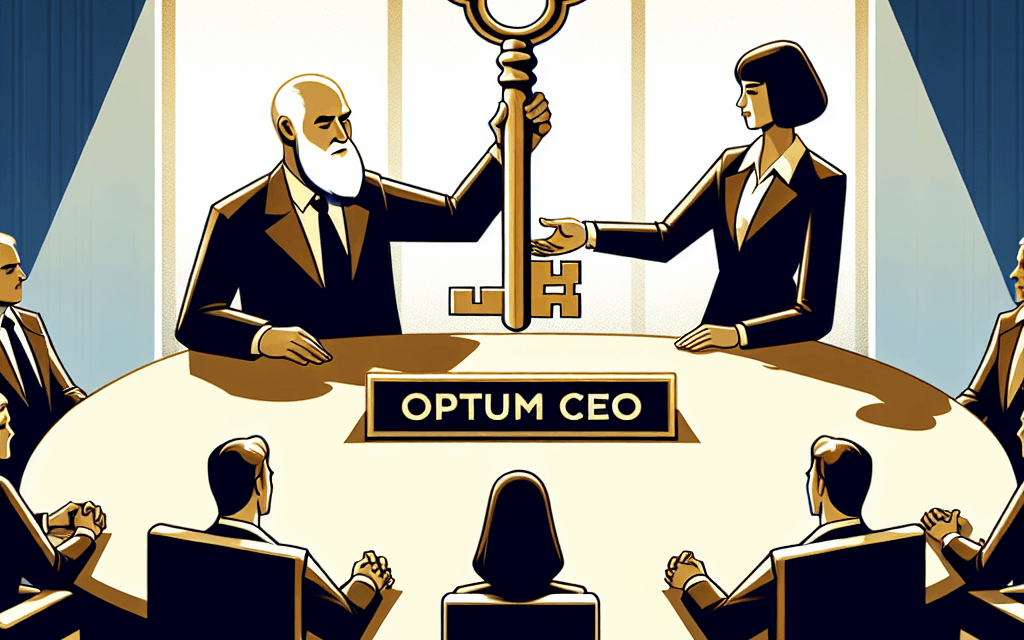UnitedHealth Appoints New CEO for Optum
In a significant move that has captured the attention of the healthcare industry, UnitedHealth Group has appointed a new CEO for its subsidiary, Optum. This decision comes at a time when the healthcare landscape is rapidly evolving, driven by technological advancements, regulatory changes, and shifting consumer expectations. This article delves into the implications of this leadership change, the strategic direction of Optum under its new CEO, and the broader context of UnitedHealth Group’s operations.
1. Understanding Optum: A Key Player in Healthcare
Optum is a health services platform that operates under UnitedHealth Group, one of the largest healthcare companies in the United States. Established in 2011, Optum has grown to become a critical component of UnitedHealth’s overall strategy, focusing on delivering integrated healthcare services that improve patient outcomes while reducing costs.
Optum is divided into three main segments:
- OptumHealth: This segment provides care delivery services, including primary care, urgent care, and specialty care. It aims to enhance patient engagement and improve health outcomes through a patient-centered approach.
- OptumInsight: This division focuses on data analytics and technology solutions, helping healthcare organizations optimize their operations and improve decision-making through actionable insights.
- OptumRx: This segment manages pharmacy care services, including pharmacy benefit management (PBM), which plays a crucial role in controlling drug costs and ensuring medication adherence.
With a workforce of over 100,000 employees and a presence in all 50 states, Optum has positioned itself as a leader in the healthcare services market. The company’s innovative approach to healthcare delivery and its commitment to leveraging technology have made it a vital player in the ongoing transformation of the healthcare system.
2. The Leadership Transition: Who is the New CEO?
The appointment of a new CEO is always a pivotal moment for any organization, and Optum is no exception. The new CEO, whose identity has been closely watched by industry analysts and stakeholders, brings a wealth of experience and a fresh perspective to the role. Understanding their background and vision is essential to grasping the future direction of Optum.
The new CEO has a robust track record in the healthcare sector, having held various leadership positions in both clinical and operational roles. Their previous experience includes:
- Strategic Leadership: The new CEO has successfully led initiatives that have transformed healthcare delivery models, emphasizing value-based care and patient-centered approaches.
- Innovation and Technology: With a strong background in health technology, the CEO has been instrumental in implementing data-driven solutions that enhance patient care and operational efficiency.
- Financial Acumen: Their experience in managing large-scale budgets and financial operations will be crucial in navigating the complexities of the healthcare market.
In their inaugural address, the new CEO emphasized a commitment to innovation, collaboration, and a patient-first philosophy. They outlined a vision for Optum that includes expanding access to care, enhancing the use of technology in healthcare delivery, and fostering partnerships with other healthcare organizations to improve overall health outcomes.
3. Strategic Priorities for Optum Under New Leadership
With the new CEO at the helm, Optum is poised to embark on a strategic journey that aligns with the evolving needs of the healthcare landscape. Several key priorities have been identified that will shape the company’s direction in the coming years.
1. Enhancing Patient Experience: One of the primary goals is to improve the overall patient experience. This involves streamlining care delivery processes, reducing wait times, and ensuring that patients have access to the information they need to make informed decisions about their health.
2. Leveraging Technology: The new CEO has a strong focus on technology as a driver of change. Optum plans to invest in advanced analytics, artificial intelligence, and telehealth solutions to enhance care delivery and improve patient engagement. For instance, the use of AI can help predict patient needs and personalize care plans.
3. Expanding Access to Care: The new leadership aims to address healthcare disparities by expanding access to care, particularly in underserved communities. This includes partnerships with local organizations and initiatives to provide mobile health services.
4. Value-Based Care Models: Transitioning to value-based care is a critical focus area. Optum will work on developing payment models that incentivize quality over quantity, ensuring that healthcare providers are rewarded for delivering effective and efficient care.
5. Strengthening Partnerships: Collaborating with other healthcare entities, including hospitals, payers, and technology companies, will be essential for Optum’s growth. The new CEO has expressed a commitment to building strategic alliances that enhance service offerings and improve patient outcomes.
4. The Impact of Leadership Change on UnitedHealth Group
The appointment of a new CEO for Optum is not just a significant event for the subsidiary; it also has broader implications for UnitedHealth Group as a whole. Understanding these impacts requires an examination of the interconnectedness of Optum and UnitedHealth’s various business segments.
1. Financial Performance: Optum has been a major contributor to UnitedHealth Group’s financial success. In recent years, Optum’s revenue growth has outpaced that of the traditional insurance business. The new CEO’s strategic initiatives are expected to further enhance this growth trajectory, positively impacting UnitedHealth’s overall financial performance.
2. Market Positioning: As the healthcare landscape becomes increasingly competitive, UnitedHealth Group’s ability to adapt and innovate is crucial. The new CEO’s focus on technology and patient-centered care aligns with market trends, positioning UnitedHealth as a leader in the evolving healthcare ecosystem.
3. Regulatory Compliance: The healthcare industry is subject to stringent regulations, and leadership changes can impact compliance efforts. The new CEO’s experience in navigating regulatory challenges will be vital in ensuring that Optum and UnitedHealth Group remain compliant while pursuing growth opportunities.
4. Cultural Shift: Leadership transitions often bring about cultural changes within an organization. The new CEO’s emphasis on collaboration and innovation may foster a more agile and responsive organizational culture, which is essential for adapting to the fast-paced healthcare environment.
5. Stakeholder Engagement: The new leadership will need to engage with various stakeholders, including investors, employees, and healthcare providers. Building trust and transparency will be critical in maintaining strong relationships and ensuring alignment with the company’s strategic goals.
5. Future Outlook: What Lies Ahead for Optum and UnitedHealth Group
The future of Optum and UnitedHealth Group is poised for transformation under the new leadership. As the healthcare landscape continues to evolve, several trends and challenges will shape the path forward.
1. Telehealth Expansion: The COVID-19 pandemic accelerated the adoption of telehealth services, and this trend is expected to continue. Optum’s investment in telehealth solutions will be crucial in meeting the growing demand for remote care options.
2. Focus on Mental Health: Mental health has gained increased attention in recent years, and Optum is likely to expand its offerings in this area. Integrating mental health services into primary care will be a key focus, addressing the holistic needs of patients.
3. Data-Driven Decision Making: The use of data analytics will play a significant role in shaping healthcare delivery. Optum’s commitment to leveraging data for insights will enhance care coordination and improve patient outcomes.
4. Addressing Social Determinants of Health: Recognizing that health outcomes are influenced by social factors, Optum is expected to develop initiatives that address social determinants of health, such as housing, education, and access to nutritious food.
5. Sustainability Initiatives: As healthcare organizations face increasing pressure to adopt sustainable practices, Optum may explore initiatives that promote environmental sustainability within its operations and supply chain.
Conclusion
The appointment of a new CEO for Optum marks a pivotal moment in the evolution of UnitedHealth Group’s healthcare services. With a focus on innovation, patient-centered care, and strategic partnerships, the new leadership is poised to navigate the complexities of the healthcare landscape effectively. As Optum continues to expand its offerings and enhance its capabilities, the implications of this leadership change will resonate throughout the organization and the broader healthcare industry.
In summary, the future of Optum under its new CEO is characterized by a commitment to improving patient experiences, leveraging technology, and addressing healthcare disparities. As the healthcare landscape continues to evolve, Optum’s strategic initiatives will play a crucial role in shaping the future of healthcare delivery in the United States.





